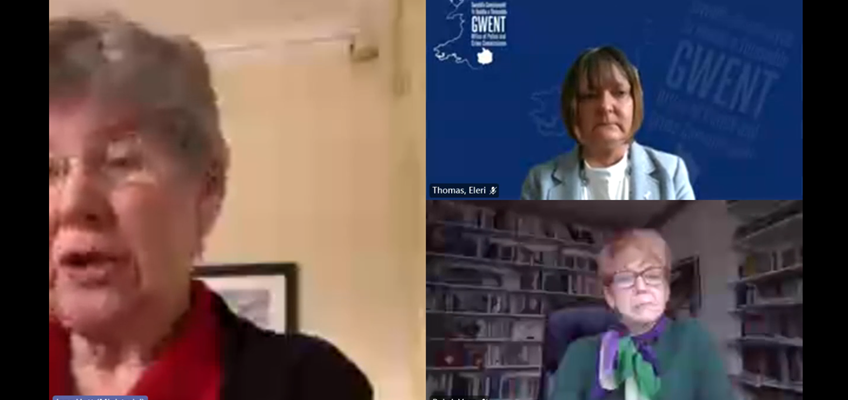Leaders praise services that transform the lives of individuals entering the criminal justice system
Two initiatives that offer help to females and young people in or at risk of entering the criminal justice system in Gwent and South Wales to break the cycle of criminality and improve their lives have been praised by the Deputy First Minister and Chief Whip Jane Hutt and Victims’ Commissioner Dame Vera Baird.
The Women’s Pathfinder Whole System Approach and 18 – 25 Early Intervention Service provides targeted support to females and young people, supporting them with issues such as alcohol and substance misuse, mental health problems, and improving family relationships. The service works to divert individuals from criminality by creating a support network and helping them to live safer, healthier lives.
Since its launch in October 2019 – September 2020 1,007 women and 1,256 young people aged 18-25 have been referred.
The services have been established as part of the wider Ministry of Justice and Welsh Government Female Offending Blueprint for Wales, and are jointly commissioned by the Gwent and South Wales Police and Crime Commissioners, Welsh Government, and HMPPS in Wales, and delivered by the Future 4 Consortium of G4S, Safer Wales, Include and Llamau.
Deputy Minister and Chief Whip Jane Hutt stated:
“The event highlighted the importance of working collaboratively to achieve positive, long-term change in our society. During this difficult time we’re all living in, it’s vitally important that we continue to work proactively with families in the justice system building on our previous work and developing new and innovative ideas, to support for the most vulnerable in our society.
“The Women’s Pathfinder Whole System Approach and 18 – 25 Early Intervention Service is essential in delivering better outcomes for young people, women and their families across Wales involved in the justice system. Despite the many challenges of the Covid-19 pandemic the service has continued to support some of the most vulnerable members of society, adapting with agility.
“Whilst justice remains a non-devolved function, the Welsh Government is committed to continuing to engage with partners to divert women and young people away from crime and into people-centred, community-based, sustainable support services that meet their needs. I am pleased that in our Draft Budget the Welsh Government is allocating a further £0.5million to the Blueprints for Female Offending and Youth Justice allowing the continuation of a number of supportive programmes including the Women’s Pathfinder project.
The comments were made during an online event to mark the one-year milestone of the services, which launched in October 2019. The event highlighted how the services have adapted to continue to provide support during the Covid Pandemic, and allowed attendees to hear from women, young people, case workers and service leads about the positive impact that the service has had on their lives and their communities.
Victims Commissioner, Dame Vera Baird said:
“It is well known now that there are people who find themselves as defendants in the criminal justice system who have suffered far worse victimisation than the crime they commit. This is particularly applicable to young people and to women upon whom a large proportion of this programme focuses so well. So, I was pleased to attend this event and it was inspirational to hear the powerful voices of women and young people who have been supported by the service. This important scheme helps individuals who are in the criminal justice system in Gwent and South Wales to build lives that are free from crime.
“Congratulations are due to the Gwent and South Wales Police and Crime Commissioners and their delivery partners for this important programme. This is a great piece of work, there are important lessons here for us to consider more widely across the UK.”
The event was coordinated by HMPPS, the Offices of the Police and Crime Commissioner for Gwent and South Wales.
Deputy Police and Crime Commissioner for Gwent, Eleri Thomas, said:
“I was delighted to welcome Deputy Minister and Chief Whip, Jane Hutt, and Victims’ Commissioner, Dame Vera Baird to the event. As advocates for victims and diversionary services it is great to see their support at events such as this.
“The Women’s Pathfinder Whole System Approach and Early Intervention System provides a much-needed person-centred approach that offers both women and young people the support they need to turn their lives around.
“The service is a shining example of an effective collaboration between public, private and third sector organisations, working together to support some of the most vulnerable people in our society, reducing offending and helping to keep our communities safe.
“It was also pleasing to see so many professionals from a variety of organisations attend the webinar including the voluntary sector, HMPPS, Public Health Wales and academics from University of Bristol and the University of South Wales.”
South Wales Police & Crime Commissioner Alun Michael said:
“I was extremely pleased to be able to support this event and I am grateful to both the Deputy Minister and Victims Commissioner for attending today in recognition of our efforts. We are clear that the approach needs to be one of asking, when a woman is first drawn into the Criminal Justice System, what the circumstances are and why the offending behaviour has taken place. If you don't understand what has caused the behaviour, then it is all too easy for the system to be both unfair and inefficient - whereas in contrast if you understand the background it is often possible to deal with the behaviour and also turn around the life of the individual involved."
“By taking a whole systems approach, the Women’s Pathfinder Programme is improving outcomes through early intervention and prompt, positive action, coordinating necessary interventions to support long lasting change and build resilience, whilst at the same time realising significant cost savings for policing, in that for every £1 spent on the Diversion Scheme, a saving of £2.35 is made.”

